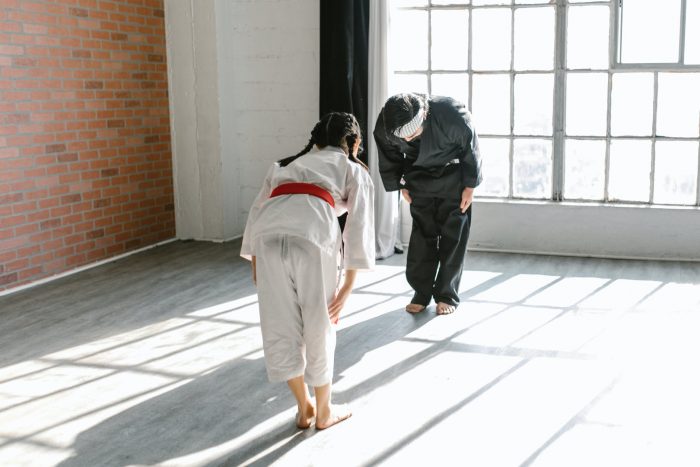We all experience conflict, and two principles from the martial arts, kime and ma, can help us deal with it and avoid feeling that life is an exhausting battle. Conflict doesn’t have to define our relationships with other people who are difficult, contentious, or determined to conquer or dominate us. Life is too short to let tense situations and aggressive or thoughtless people get the better of us.
Kime (KEY-may) means focus: the right force, at the right place, at the right time. It involves being “loose, loose, tight, loose”—remaining loose except in those moments when you need to put forth a concentrated effort. In karate or judo, kime is the moment of a focused kick, punch, strike, or throw.
In a conversation with someone who is being too forceful, practicing kime means that you listen attentively and then, when the moment is right, set a firm boundary. You speak your truth or take some other action rooted in clarity and purpose. When dealing with a challenging person, practicing kime will keep you in a state of relaxed and attentive observation, which will make it easier for you to consider their perspective and personal experiences.
Think about the other person’s body language—including their facial expression, tone of voice, and gestures. What are they conveying? It’s easier to remain focused as you listen if you let go of your urgent desire to make a point or correct the other person.
If you start feeling irritated or frustrated, breathe deeply, allowing your nervous system to be on alert but not hijacked by an intense “fight or flight” response that can blind you with anger and cause you to say something you’ll regret. Should your muscles tense up, you can consciously relax them. The goal is to have clarity and energy available to you when you recognize it’s time for us you speak. Remaining loose, unconstricted by anxiousness or irritation, lets you move smoothly and quickly when you assert yourself. In contrast, remaining tight, with muscles tense, waiting for your chance to “win” an argument by taking strong action, will tire you out and keep you from truly hearing what the speaker is saying. It’s best to keep your cool and trust that you will find the right words to say at the right time to make your point.
Are there situations that cause you to be too “tight”—too on edge and defensive? It’s hard to see clearly when you become upset, and it’s easy to jump to conclusions such as “This person meant to hurt my feelings” or “This person doesn’t care that they’re upsetting me.”
Of course, in any conflict, you don’t want to miss your chance to make your point. You have to be sure not to remain loose for so long that you passively retreat or give in without speaking up or taking needed action. Otherwise, you might find that often, difficult people are taking advantage of you. Your relationships may start to feel one-sided and draining. Practicing kime can help.
Ma is a strong partner for kime when it comes to martial arts wisdom we can use in our everyday lives. Ma is the principle of right distance: not too close, not too far. If a competitor is too close to someone with whom they are sparring in a karate or judo match, their action will be restricted and won’t have full impact. If the competitor is too far away, they won’t be able to reach their opponent to make a strong impact on them.
Similarly, if you’re too close to or too far away from a situation emotionally, it can be a problem. Let’s say you’re attached to having someone who has a habit of disrespecting you speak to you respectfully. That’s a reasonable expectation. If you don’t practice ma, your emotions might get the better of you, making you struggle in vain to deal with the situation effectively when you perceive that the other person is once again speaking to you disrespectfully. However, you might find you lack emotional objectivity in this situation. For example, an attachment to having the other person keep their voice down rather than raising it could be so strong you can’t think clearly or come up with a win-win solution when the speaker grows louder. That can feel like a disrespectful attack whether it’s meant to be received that way or not.
Maybe the speaker is upset—not at you but at the situation they’re in—and they don’t mean to sound disrespectful. Triggered by their loud voice, you become angry, not realizing that this person didn’t actually intend to be disrespectful. Simply asking the speaker to be mindful of their tone and the words they use might be enough to elicit an apology and a renewed commitment to change their way of speaking to you. Being angry and upset may only serve to make you unnecessarily uncomfortable.
Another example of not practicing ma is when you’re too far away from your emotions and those of someone else who is upset. Then you can lose your ability to be empathetic toward that other person and too quickly dismiss their feelings and desires, thinking only of yourself and your desire for quiet and a lack of “drama.” Your impatience and even callousness might further upset the other person, making it difficult to achieve a compassionate resolution to a conflict.
Letting go of your emotional energy of resentment, frustration, or anger can help you have the energy to take the right decisive action at the right time. That can make any conflicts with others more productive and more likely to have a good outcome for both people.
If certain people challenge your ability to remain loose, loose, loose until you’re ready to speak or act, you can decide to avoid them. However, you can also choose to look more closely at how they are or aren’t preventing you from changing your dynamic with them. Changing the way you interact with them, practicing kime and ma in any conflicts, could be very helpful.
Let’s say you’re too relaxed and accepting of situations. You might feel that avoiding conflict is the easiest and safest choice. You might be feeling drained and defeated—or too detached to feel you can become more assertive. Think about how to make it easier to bear down and focus when that might be the best choice. For example, maybe you have meetings with people you work with that feel unproductive and time-consuming, yet you don’t speak up about the problem. You could decide to tighten up, focus, and take a stand for change that could benefit everyone.
Where are you too close to a situation, picking up the emotions of others and not being able to give comfort or objective advice?
Where are you too distant and removed, unaware of what’s really going on for the other person?
Being “above the drama” can make it hard to help them—and helping them might not be as stressful as you might think it will be. I have discovered that sometimes, people just want to be heard—to be listened to long enough to feel they are valued. Then, they shift on their own. Their emotional intensity gives way to a calmer state in which they are open to solving problems and listening to others speak.
All relationships involve conflicts, and when you handle these well, you can experience greater trust, deeper emotional intimacy, and stronger partnerships. Families and communities benefit when we choose to lean into a conflict and handle it with the “just right” amount of distance and connection, when we stay loose until the time for focused action is at hand and return to a relaxed state afterward. We don’t have to be exhausted by conflicts when we keep in mind the principles of kime and ma and use them in situations that have solutions we can’t necessarily see in a moment of tension.
Martial arts wisdom isn’t just for people who want to physically spar with an opponent: It can help anyone better handle tense situations and clashes with other people.







Read 0 comments and reply